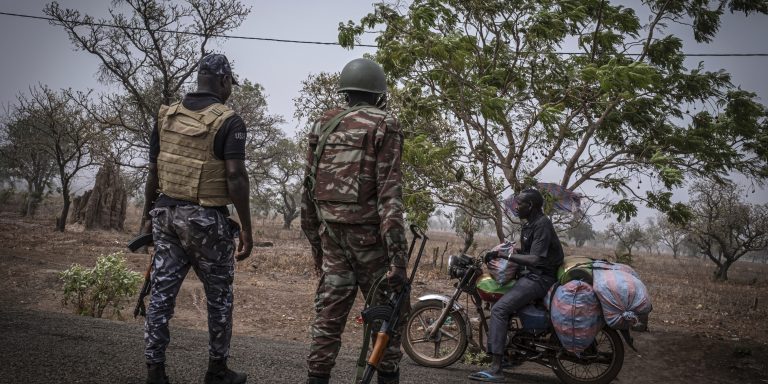INTELBRIEF
March 8, 2023
IntelBrief: The Sahel Continues to Struggle with a Surge of Jihadist Terrorism

Bottom Line Up Front
- The French withdrawal from Burkina Faso amid pressure from the Burkinabe junta is likely to lead to a worsening security situation and further erosion of democracy in the country.
- Burkina Faso’s government has stated that Russian mercenaries from the Wagner Group will not replace French special forces, but suspicions linger that Russian “trainers” may still be employed along with Russian military support to the junta.
- An attack by Islamic State in the Greater Sahara (ISGS) that killed more than 50 Burkinabe soldiers last month demonstrates that jihadist groups have not been pacified in the country or the region as a whole.
- Côte d’Ivoire will become West Africa’s counterterrorism hub and host French troops, which will likely still be insufficient to stem the rising tide of violence throughout West Africa.
Late last month, Islamic State in Greater Sahara (ISGS), officially known as “Islamic State in Sahel Province,” claimed an attack that killed 70 soldiers in Oudalan Province, Burkina Faso. Although media reports suggest the death toll may have been closer to 50 soldiers, the attack indicates that the “dual war” in Burkina Faso continues. On the one hand, there is fighting between ISGS and the Burkinabe army, while at the other end lies an intra-jihadist civil war between ISGS and the al-Qaeda affiliate in the Sahel, Group for Supporters of Islam and Muslims (JNIM), both of whom are attacking soldiers and civilians throughout the region. Only one week before the ISGS attack, Burkina Faso announced that France had completed its withdrawal of military forces from the country after the Burkinabe junta, which came to power through a coup last year, demanded their departure from the country. However, the continuing lack of progress in restoring democracy combined with struggles in containing the growing strength of jihadist groups — as evidenced by the latest ISGS attack, among others — suggest its anti-France rhetoric is intended to help the junta maintain sufficient public support to remain in power.
As the former colonial power, France had already developed an unfavorable reputation among the Burkinabe and, more generally, West African public. Public sentiment in the region has been vocal in seeking distance from previous colonial powers and French President Emmanuel Macron has also previously decried reported efforts to dislodge support for France through widespread disinformation campaigns. Therefore, by appealing to ejecting the former colonial power from the country while also blaming France for failing to curb the insurgency, the junta has been able to detract from its own failings. Moreover, by pushing French troops out of the country at a time when France and other Western nations have begun to criticize the junta’s authoritarianism, the junta can either marginalize these critical voices or make it seem like France and other Western critics are simply bitter over the junta’s decision to “preserve its sovereignty.” In contrast to France, Russia’s Soviet legacy in the region includes a history of supporting Communist insurgencies throughout sub-Saharan Africa during the Cold War and supporting newly independent states through defense and diplomacy. The Burkina Faso junta’s anti-French rhetoric is currently aligned with Russia’s efforts to stoke African support for its war in Ukraine while denigrating Western and NATO efforts to assist Kyiv. Wagner Group mercenaries have played an increasingly prominent role in offering security to some African countries, including Mali, heightening tensions with many Western states. Although the Burkinabe junta has claimed it will not accept Wagner as a matter of sovereignty, which helped ease tensions with the West, suspicions have surfaced in recent weeks that the junta may make an about-face by potentially accepting Wagner “trainers.”
Among other problems with Wagner in the Sahel — beyond existing reports of its members committing war crimes and other atrocities in the region and in countries like Libya, Syria, and Ukraine — the mercenary force does not appear to have enough “trainers” on the ground to significantly impact the counterinsurgency. Even several thousand well-trained French forces with experience in the region have been unable to pacify ISGS or JNIM. Wagner’s prospects for success also assumes that the group even has the requisite skills to train the Burkinabe forces. Nevertheless, Russia can provide Burkina Faso’s junta with weapons and "trainers" or "advisers" to demonstrate gratitude for the junta enabling Russian influence in the Sahel and to ensure access to the country’s precious natural resources. Yet given the junta’s desire to maintain power, it is possible these weapons will not be used for counterinsurgency as much as they will be used to suppress countercoups or uprisings.
France appears unlikely to completely withdraw from the Sahel, but rather may substitute Côte d’Ivoire as its new base in the region. After the French withdrawal from Burkina Faso, France’s defense minister pledged to increase military support to Côte d’Ivoire, where French troops are already stationed and which served as a logistics base for the French counterterrorism mission to Mali. With a thriving economy compared to others in the Sahel, the West African government is less likely to use populist political tactics to direct public grievances against France. Moreover, despite election violence in the country in 2020, organizations such as Freedom House have observed an overall increase in civil liberties in the country in recent years. Côte d’Ivoire is also situated on the borderlands of Sahelian states like Burkina Faso, and although it has rarely been struck by jihadist attacks, it provides a location where France can closely monitor ISGS and JNIM. The situation, meanwhile, remains dire for Burkina Faso, which experienced more terrorist attacks than any African country last year and seems unlikely to take measures to seriously reverse that trend.